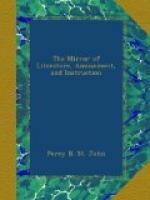* * * * *
MANNERS AND CUSTOMS.
* * * * *
LAWS RELATING TO BACHELORS.
Many laws have been made against bachelors by various nations, who all concurred in considering the bachelor as an enemy to his country and to mankind. The chief of these laws were those made by the Romans, and consisted of fining the bachelor, and various other penalties: the most celebrated one was that of Augustus, which was entitled the “Lex julia de maritandis ordinibus” by which the bachelor was made incapable of receiving legacies, or of holding inheritances given by a will, unless they were bequeathed to him by a near relation. Plutarch observes that this brought many to marry, not for the mere sake of raising heirs to their estates, but to make themselves capable of receiving legacies, and for the purpose of inheriting such estates as might be left them by a friend.
The Jewish nation also had their laws to the disfavour of the bachelor. The rabbis affirm, that according to the Laws of Moses, every one who has attained the age of twenty-one years is bound in conscience to marry; and this makes one of their 613 precepts. We should suppose that if this law ever had existence, it has been handed down by tradition, as we cannot find any trace of it in the “Books of Moses.” Their “wise men” have many sayings in favour of marriage and against bachelors, one of which is “He who does not take necessary means to leave heirs behind him, is not a man, and ought to be reputed as a homicide.” The Law of Lycurgus was not a shade more favourable to them: by his statutes, bachelors were branded with infamy and disgrace; they were also excluded from participating in the cares of government, from all offices either civil or martial, and were not permitted to view either public shows or sports. At certain of their feasts, they were forced to appear in the marketplace, and there were exposed to the cutting sarcasm, jest, and derision of the populace. At one feast, in particular, they were led to the altars by women, amidst a concord of harmonious sounds, and there were obliged to submit to blows and lashes with a rod, at the merciful pleasure of a merciful people. And “Oh, most unkindly act of all,” they had also to sing certain songs composed to their own dishonour, contempt, and derision.
By many, the Christian dispensation is supposed to be, in a great degree, favourable to a state of bachelorism, because the Apostle, Paul, has recommended it as preferable; but we think the recommendation was given for the following reason: (i.e.) every one in the early ages of Christianity was exposed to liability of testing his religious principles, by the loss of both his property and life; and consequently, the loss must have been felt in a greater degree, if the sufferer was married. Thus persecution must have been




